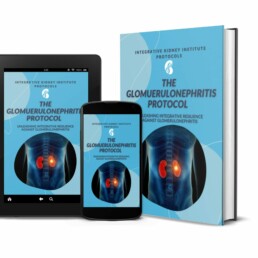Proton pump inhibitors (PPIs) are a group of medications that suppress stomach acid production. They work by suppressing the pump that produces acid in the stomach lining. These medications can be very effective and have a significant role in treating stomach ulcers in the acute setting. This led to their popularity among many providers as a go-to medicine for managing “gastric acid reflux.” Here, we will discuss the association between proton pump inhibitors and kidney disease.
By Majd Isreb, MD, FACP, FASN, IFMCP
Proton pump inhibitors (PPIs) use is so common. I am confronted with patients on long-term PPIs every day in my practice. The indication ranges from acid reflux to a history of gastrointestinal bleeding. These medications are now available over the counter and relatively inexpensive.
However, their widespread use of PPIs has aggravated many other medical issues. They are now linked to cardiovascular disease, osteoporosis, poor digestion, nutritional deficiencies, and kidney disease. While I am not a gastroenterologist, I will discuss the problems with their use and specifically discuss their effects on the kidneys.
The myth of acid reflux
The disease known as gastroesophageal reflux (GERD) is widespread, affecting more than 20% of the U.S. population. This disease which is the product of our modern living can lead to severe consequences, including esophageal narrowing and even cancer.
The main problem with GERD is that the sphincter that separates the stomach from the esophagus is leaky. So, the stomach’s content in this disease is not going in the right direction. Instead, it is leaking to the esophagus.
GERD is, therefore, a motility problem, not an acid problem. However, current medical therapies focus on the acid part of the problem. Perhaps, this is because patients often feel a caustic burning sensation. This led to the proliferation of medications such as PPIs to suppress stomach acid production.
The role of stomach acid
Stomach acid plays an essential role in the digestion and absorption of food. This hydrochloric acid is produced by the cells that line the stomach. In conjunction with other enzymes, it acts as the first step in the digestive process. The acidity of the stomach also kills harmful bacteria.
In addition, stomach acid is vital for the digestion and absorption of protein, vitamin B12, iron, calcium and magnesium, and other minerals. Patients who lack stomach acid end up with various types of anemia and osteoporosis. Besides, poorly digested food can cause multiple symptoms and ferment, leading to the overgrowth of “bad” bacteria in the small intestine (SIBO).
The problem with the long-term use of a PPI
Long-term use of PPIs was associated with decreased bacterial richness and significant change in the gut microbiome. This has been linked to a decrease in the growth of “good” bacteria and an increase in “bad” bacteria. This dysbiosis is associated with many GI disorders, inflammation, and autoimmune diseases.
The use of PPIs was also linked to poor cardiovascular outcomes. They have been found to increase the risk of heart failure and death in patients with coronary artery disease. In a collective analysis of 23 studies (meta-analysis), PPIs also led to a 30% increase in major adverse cardiovascular events.
Furthermore, the long-term use of PPIs was connected to lower bone mineral density and a higher rate of osteoporosis. This is widely thought to be due to their effect on decreasing intestinal calcium absorption.
PPI use has also been linked to vitamin B12 deficiency, iron deficiency, and magnesium deficiency, among other nutritional deficiencies.
Proton pump inhibitors and kidney disease
PPI use has been linked to the development of acute interstitial nephritis (AIN, a kidney disease that affects the tubules and the tissue surrounding them). In fact, the use of PPIs was associated with a three-fold increase in the risk of AIN. This presentation is usually due to an immune response to PPIs and may improve with discontinuation. However, half of the patients may not recover and go on to develop CKD.
On top of that, the effects of PPIs on magnesium absorption cause magnesium deficiency. Low magnesium has been linked to various disturbances that can lead to CKD directly or indirectly.
PPI use was also associated with an increased risk for CKD, faster progression of CKD, and increased mortality in CKD patients.
Yet, all the studies I shared (via links) were observational. To date, there is no randomized controlled trial to confirm these findings. Such a study is likely unethical. Therefore, conventional researchers and authors suggest caution when reviewing this literature.
GERD, a motility disorder
Approaching the management of GERD as a motility disorder can significantly improve and even cure this disorder. This can be done by avoiding triggers such as foods, stomach over-distention, smoking, stress, and losing weight. Replacing nutritional deficiencies, eating more fiber, and digestive enzymes can also improve gastric emptying. The use of supplements, if necessary, can help symptom relief and repair the esophageal lining.
The bottom line
The long-term use of PPIs can be associated with various adverse outcomes. Observational studies demonstrated a link between using proton pump inhibitors and kidney disease. Patients taking PPIs for a long time without a specific indication should be reassessed. Gradual de-prescribing should be considered for these patients under an experienced Integrative medicine provider.




